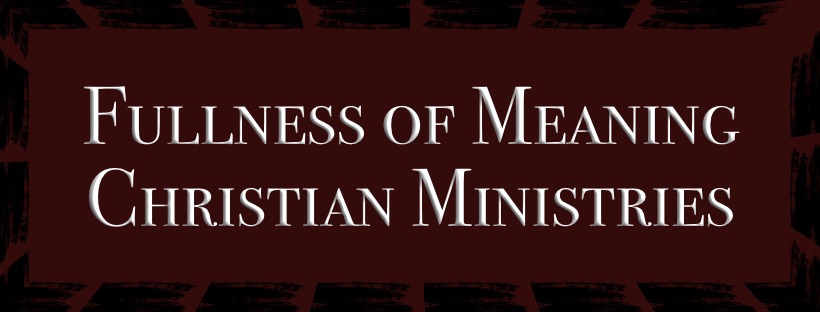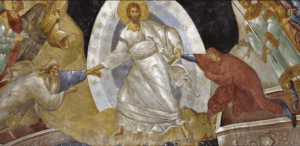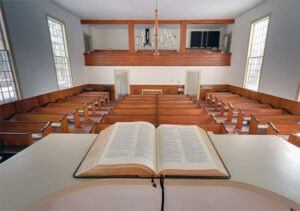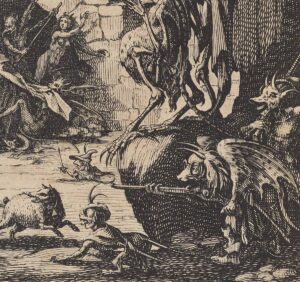*To know what something is – is to know what it is not*
-k.j.-
PREFACE
The Greek word for “time segment”, or, Aionios was contrasted with Adios – meaning “infinity”. These two terms were used throughout Homeric times down to the 1st century A.D. Christian Church. As we introduce the term “Adion” for infinity in this lecture piece we will see what Aeon is not.
I will be clear: Aeon, meaning “a segment of time”, “an era”, “an eon”, “an age” and “a limited/unknown ‘finite time”, was employed by the Biblical writer, John, in his Revelation – or, “Apocalypse”, for the usage of Hell within its “aeon of purpose”. Moreover, the “ontology” or “coming to be” of ‘an age’ of ‘being a sinful human’ requires AN aeon or “era” of hell to refine them to God; this intimates ‘direction’, therefore, INTENT of a GOD to create a passageway by which we will be refined, ready, and reserved for the final destination, i.e., UNION with GOD.
We, therefore look at our part 4 focusing on the ‘’vocabulary bank’’ by which the New Testament used its terms for Eternity, Perpetuity, Eons, Ages, and infinitude.
Parts 1-3 covered Aeon in all of its forms. We conclude that “Aeon” was used as an *finite undefined time segment*.
Our next focus is Adios (Adion). Since we have seen by its usage that Aeon is not an ‘unending’ term we therefore look to Adios.
We continue to go to the archaic authors of the Greek and Hellenized world to see that ‘Aidios’ was socially normalized in its usage. Again, words are used in their participation of the figuration of a culture. I reiterate from my past 3 lectures that the beginning New Testament community (ca 30 A.D.) had its rich linguistic heritage spanning at least 800 years, if not more, from the Classical Greek authors.
Examples of TIME: ETERNITY Adios and Chronos working together
Time (1)
One of the earliest cultural usages and accounts of Adios is found in Homer’s “Hymn to Hestia” (ca. 800 B.C.). Here, the ‘goddess resides on a throne’ with mortals. This, by context alone, should give us ample information to see that there is a kind of “time” that can ‘participate’ in this “throne realm” but is separate from….for …if mortality exists there, then ‘mortality’ requires sequential time or “chronos”—which is separate and distinguished from Aidion as we shall see.
Chronos is neither subsumed or supervened by Adios at this aforementioned juncture, rather, they (Chronos and Adios) share their ‘attributes’ at certain juncture points for a fuller gestalt of meaning. That is, time and eternity (chronos and Aidios) are ‘conjunctive’ as ‘time’ meets the eternal…or, relating to mortals → **the epiphanal**.
We see Hestia, the Goddess of the *Hearth/ Throne* sitting at her ‘permanent seat’….”edren aidion elaxes”. Such as ‘seat/ throne’ is the hearth at the fireplace. It is where the family convened to talk, eat, share, cook, stay warm, associate with HOME. Hestia, was considered LOVE, THE BELOVED…and, in this Maiden Housekeeper sense, she was Divinely Eternal Without End. Hestia was called, “She of the Public Hearth”. So, there is a sharing of the “time” of mortality and this AIDION throne. This is no more contradictory than when the Eternal God of the Bible talks with the Patriarchs, Matriarchs and Prophets. How About the answerable Platonic idea of “coming to be” to the FULLNESS of the UNIVERSAL found in the very NATURE of JESUS CHRIST ‘coming to HIS FULLNESS?!? I.e., When the UNIVERSAL meets the Particulars. The “participation” by which the gods, Gods act involves such a confluence of different “times”.
Time (2)
We find Aidios inscribed in Hesiod’s “Shield of Hercules” saying, “‘aidion eixon ponon”. This means that no one side can win in this athletic competition. It states the ‘stasis’ by which movability cannot be achieved, therefore, ‘without end’ —–in the duration of the game. But here’s the catch: it is in the ‘picture’ of stasis without resolution. This depiction fires on the mind a never ending battle for glory without resolve….a state of being…a longsuffering of worldly effort…the battle of the EPOS (‘epic ones’) or “eroes” (“heros”).
Time (3)
Anaximander’s ( A.NAX’.uh.MAN.der) Greek says, “Tayn Aidion Kinaysin” —i.e., “The Aidion is perpetual movement”, —-therefore, Aidion shows no retirement of motion, hence, no *aging*.
Time (4)
Anaximenes (A.NAXIMENEEZ) says,”Kinaysin de kai hootos aidion poiei” as to agree with Anaximander.
Time (5)
Anaximander went on to say, “There is a certain NATURE of the infinite” – “phusin tina tou apeirou” – “and that this NATURE is ETERNAL and UNAGING” – “Aidion ein kai a.gayro {“a” = “not” + gayro’ – aging/ i.e., ‘geriatric’}”.
Time (6)
Xenophanes (XSE.NAH’.fa.neez) attests Adios as “indestructable”, immortal, and ungenerated (i.e., uncreated). Xenophanes uses Adios in contrast to anything that is “coming to be” —or “generated”. To conclude Xenophanes: anything that segways to the next event is not Adios.
Time (7)
Diogenes (DIE-AH.jeh.neez) Laertius (Lay.er.ti.uhs) simply agreed with Xenophanes here.
Time (8)
Anaxagoras agreed with Aristotle that “Adios” is ‘without end’
Time (9)
Heraclitus says, “Adios is perpetual motion of things without end”. These “Things” therfore do not share in the attributes of Aeones.
Time (10)
Empedocles says, “There is a “THING OF NECESSITY”, an ancient DECREE of *gods ETERNAL*—- i.e., “Anankayce Krayma Theon Psaypheesma Palaion Aidion”. Conclusively brilliant, Empedocles continues to his conclusion that Aidion is “spherical, eternal, and immobile” – i.e., “Sphairo-eides Kai Aidion Kai Akin-ay-ton To Hen”.
Time (11)
Parmenides used the term Aidion to mean “ALL” in the sense of “ALL that will always be…ALL that is ungenerated and imperishable”.
Time (12)
Simplicius says, “nothing that has a beginning and end is Aidion”
*Time (13)
For me, maybe the most important statement was from Metrodorus of Chios who stated, “The ALL (TO’ PAN) is Eternal (AIDION), Because, If It Came Into Being At A Certain Moment, It Would Come To Be From Non-Being; And It Is Unlimited (Apeiron) Inasmuch As It Is Eternal: For It Does Not Have A Principle (Archay) From Which It Began, Nor A Limit (PERAS) Or An End (TELEUTAY)”.
For today I will end our section on the usage of Aidion in Greek Antiquity.
Thank you, Kyle Jones
Post Statement and Recap
Our job at fomcm.com is to search for historically overlooked material that substantiates the Bible to the regard that it should be given.
Often, the Westerm “orthodox approach” ‘limits’ the purview of the authentic linguistic content, a.k.a., “Message” of God’s Word by *Westernisms* or recognizable ideas that fit into ‘our sense’ of our Orthodox god. Sadly, the robbery is by and to the ‘church’ by which its failures are founded upon limitations of Eastern Understanding of the Biblical Text. One limitation after the next, always trying to ‘keep up’ with the ever reducing idea of the ‘so called biblical text’ which is currently founded upon man-made notions of God.
Fear is the engine by which ‘an orthodoxy’ fights not repent. Scientists have to secularly ‘repent’ when they find something that counters and finally disproves an older thesis–which becomes no-more-scientific…but simply, WRONG….. . Likewise, Theology SHOULD contain the same humility within their “orthodoxies” —as I speak ‘tongue and cheek’. And again, once there has been grounds for challenging the English Text of King James…one should be allowed to find answers to countertheses via an orthodox ‘council’ without agenda. It is here that I make mention of “rhetors” from the Paideia of the class Trivium.
I speak of “rhetors” in the classical sense by which the first grade of learning Greek and Latin language began the Trivium’s rite of passage to academic bliss. Then, from Language to logic. Finally, argumention (or rhetors) was taught by the very wise secular Greek and Hellenized Christian mothers of the first and second centuries.
These 3 phases (language, logic and rhetors) of the Trivium ( by which the educated Greek class lived) led facets of Greek culture to be strung together with respect and congruity of thought……and not as brute beast ‘authoritarians’ who ‘brawl’ over ideas for dominance and not truth. I need not discuss the brutal nature of this approach in today’s world.
In contrast to this last mentioned civil unrest…. the Paidea of the Greek’s Trivium created learned scholiasts of the Biblical Text to find their ‘senses’ in historical comparitive hermeneutics, Biblical Greek analysis and parsing of the stems of Greek Grammar, socially-contextualizing and examining the socio-linguistic understanding by which the geographical ‘neighbors’ of the Palestinian Jews and Christians understood their God. THIS IS of the Hebrews and New Testament Christ, and, finally, exegete the Biblical Textus Receptus or “Received Authoritative Greek and Hebrew Bible”—as well as the LXX or Septuagent, i.e., the Greek Old Testament by which we have transferable Greek terms with Hebrew.
Finally, fomcm.com gathers writers of Greek pagan antiquity to show that the ‘vocabulary bank’ of the New Testament was not out of a ‘vaccum’. Rather, the Greek New Testament used the Greek language that the ENTIRE Greek world had been baptized in, saturated, steeped in since the inception of Greek culture. This is nothing to overlook, and yet, the Western American Orthodox Church has somehow or another concluded to not deem it important to know what the New Testament REALLY WAS SAYING IN THEIR DAY, THEIR CULTURAL CONTEXT, THEIR SEMIOTIC AGREEMENT, THEIR SLANG, THEIR WAY OF SAYING THINGS, IDIOMS,
DIALECTS, etc…. I hear from western ‘authorities’ of the ‘orthodox churches’ saying that “devotion is over theology”. You can’t ‘devote’ to something ill-defined. Why fear exegeting while ‘working on your *devotion*?’. *What IF, ….the “MATHETIKON” (in the Greek) meant “TOTAL DEVOTEE” to the LOGOS or Christ as He spoke on Earth?!!—Well, it does! Lastly, I say….”if you *know* the God you serve then you will serve HIM correctly; otherwise, there will be a false sense by which you relate to the WORDS that HE has spoken and YOU have so neglectfully handled in your isoglossed cultural *SENSE* of “”devotion””.
RECAP
Remember, “Indefinite time” does not have to mean “infinity”, though it could. The WAY in which Aeon and Aidion were used as ‘indefinite times’ were poetically and philosophically expressed a complimentary union of ideas.
Such poetical employment of words could be used to create the seemingly “irrational” mental state of either the poet or the characters by which participate. Therefore, subsuming the ‘rational’ for a beautiful alien ‘irrationality’, if conveyed by the poet correctly, could arrest one’s senses and lure one’s self out of the lust, greed, covet, anger world.
This “irrationality” created words fit for philosophical treatise for the words has concretized into ‘meaning’ and a correlative ‘semiotic commitment’. Hence, the mathematician-philosophers had a ground to work from.
It is not so strange to look at a word complex if we understand ‘pictographic societies’ as our ancestral origins. Herein lies the genius of the Greeks that was not so different, if not related, to the pictographic societies of the Egyptians, Sumerians and the Original Ancient Hebrew pictographic texts of the Pre-Sinaitic Israelites. Such ‘radicals’ as “fire, serpent, toxic, 6 wings, etc.” did indeed mean the “Seraph” or angels that flew with the temple of God in HIS ETERNAL “Train” or Verb of Perpetual – unending Motion through and into this “temporal state”. This is the “Parousia”, per se, of the Old Testament God who condescends to us.
Nonetheless, the force of each archaic Greek word was known by a millennia of usage for the exact purpose to specify categories of thought, therefore, distinguishing one term FROM the other.
The richness of Greek vocabulary is found in how one word can dance around the other, never stepping on the other’s semiotic ‘toes’ —- only reinforcing the other’s role, creating a union of ideas and images due to the strength and value the Greeks held to word care.
To paraphrase Edward Gibbon, the author of the Decline of the Roman empire, “Empires Fall when the study, usage, retention, and guarding of their language is no longer preserved. Double entendres, business-speak, cultural popular slang, etc. are the beginnings of this sorrow”.





